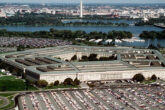June 17, 2014
New Komeito: if Japan enters a combat zone, turn right ‘round and come on home
Big things are afoot in Tokyo, as Prime Minister Shinzo Abe’s government nears a milestone in its attempts to make Japan a more normal country on national defence. Abe wants to allow Japan limited exercise of the right of collective self-defence, through reinterpretation of country’s pacifist constitution. His party, the LDP, is in intensive discussions with its coalition partner, New Komeito, in order to get a final deal approved by 22 June. The United States will accept and support whatever results from Japan’s sovereign democratic process—especially as any progress on the long-time sticking point of collective self-defence is better than none. But in a disappointing development, the LDP appears to have made a concession that forecloses an immense opportunity to advance the US–Japan alliance to new levels of coordination, interoperability and, ultimately, efficacy.
At issue is what is called ‘integration with the use of force’ in situations where Japan hasn’t come under direct attack. The question is whether, in a regional contingency—think Taiwan, the Korean Peninsula, or even a Malacca Strait crisis—the Japan Self-Defense Forces (JSDF) could operate in support of US forces conducting combat operations. Current laws and regulations limit the JSDF to providing ‘rear area support,’ such as replenishment, refueling, and data sharing, only in non-combat zones; as soon as shooting starts, the JSDF must steam away. Abe sought to extend the provision of rear area support to combat zones as well, but he appears for the moment to have given up on this particular point, with the exception of search and rescue operations. Keeping the JSDF almost completely out of contested spaces might make political sense to get New Komeito’s buy-in on this and other important issues, but it foregoes a potential operational windfall for the US–Japan alliance as a whole.
More from CNAS
-
DEFAERO Strategy Series [Apr 09, 25] CNAS' Becca Wasser and Phil Sheers on Revitalizing the U.S. Defense Industrial Base
On this episode of the Defense & Aerospace Report Strategy Series, sponsored by General Atomics Aeronautical Systems, Becca Wasser and Phil Sheers of the Center for a New Amer...
By Becca Wasser & Philip Sheers
-
From Production Lines to Front Lines
Executive Summary The U.S. defense industrial base (DIB) is struggling to meet the demands of the current strategic environment—let alone prepare for a potential conflict agai...
By Becca Wasser & Philip Sheers
-
The Pentagon’s Endangered Brain Trust
In this environment, sound assessments of emerging threats and new ideas to counter them will be especially vital....
By Dr. Andrew Krepinevich, Jr.
-
Ep 187: Richard Fontaine on the “Reverse Kissinger”
Richard Fontaine, CEO of the Center for a New American Security (CNAS) and co-author of No Limits? The China-Russia Relationship and U.S. Foreign Policy, joins the show to dis...
By Richard Fontaine




